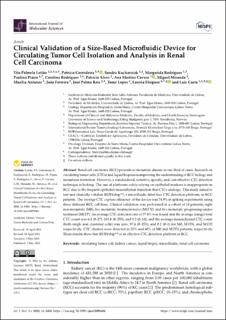Clinical Validation of a Size-Based Microfluidic Device for Circulating Tumor Cell Isolation and Analysis in Renal Cell Carcinoma
| dc.contributor.author | Leitão, Tito Palmela | |
| dc.contributor.author | Corredeira, Patrícia | |
| dc.contributor.author | Kucharczak, Sandra | |
| dc.contributor.author | Rodrigues, Margarida | |
| dc.contributor.author | Piairo, Paulina | |
| dc.contributor.author | Rodrigues, Carolina | |
| dc.contributor.author | Alves, Patrícia | |
| dc.contributor.author | Cavaco, Ana Martins | |
| dc.contributor.author | Miranda, Miguel | |
| dc.contributor.author | Antunes, Marília | |
| dc.contributor.author | Ferreira, João | |
| dc.contributor.author | Palma Reis, José | |
| dc.contributor.author | Lopes, Tomé | |
| dc.contributor.author | Diéguez, Lorena | |
| dc.contributor.author | Costa, Luís | |
| dc.date.accessioned | 2023-11-20T15:23:08Z | |
| dc.date.available | 2023-11-20T15:23:08Z | |
| dc.date.created | 2023-06-02T13:20:47Z | |
| dc.date.issued | 2023 | |
| dc.identifier.citation | International Journal of Molecular Sciences. 2023, 24 (9), . | en_US |
| dc.identifier.issn | 1661-6596 | |
| dc.identifier.uri | https://hdl.handle.net/11250/3103710 | |
| dc.description.abstract | Renal cell carcinoma (RCC) presents as metastatic disease in one third of cases. Research on circulating tumor cells (CTCs) and liquid biopsies is improving the understanding of RCC biology and metastases formation. However, a standardized, sensitive, specific, and cost-effective CTC detection technique is lacking. The use of platforms solely relying on epithelial markers is inappropriate in RCC due to the frequent epithelial-mesenchymal transition that CTCs undergo. This study aimed to test and clinically validate RUBYchip™, a microfluidic label-free CTC detection platform, in RCC patients. The average CTC capture efficiency of the device was 74.9% in spiking experiments using three different RCC cell lines. Clinical validation was performed in a cohort of 18 patients, eight non-metastatic (M0), five metastatic treatment-naïve (M1TN), and five metastatic progressing-under-treatment (M1TP). An average CTC detection rate of 77.8% was found and the average (range) total CTC count was 6.4 (0–27), 101.8 (0–255), and 3.2 (0–10), and the average mesenchymal CTC count (both single and clustered cells) was zero, 97.6 (0–255), and 0.2 (0–1) for M0, M1TN, and M1TP, respectively. CTC clusters were detected in 25% and 60% of M0 and M1TN patients, respectively. These results show that RUBYchip™ is an effective CTC detection platform in RCC. | en_US |
| dc.language.iso | eng | en_US |
| dc.publisher | MDPI | en_US |
| dc.rights | Navngivelse 4.0 Internasjonal | * |
| dc.rights.uri | http://creativecommons.org/licenses/by/4.0/deed.no | * |
| dc.title | Clinical Validation of a Size-Based Microfluidic Device for Circulating Tumor Cell Isolation and Analysis in Renal Cell Carcinoma | en_US |
| dc.title.alternative | Clinical Validation of a Size-Based Microfluidic Device for Circulating Tumor Cell Isolation and Analysis in Renal Cell Carcinoma | en_US |
| dc.type | Peer reviewed | en_US |
| dc.type | Journal article | en_US |
| dc.description.version | publishedVersion | en_US |
| dc.source.pagenumber | 0 | en_US |
| dc.source.volume | 24 | en_US |
| dc.source.journal | International Journal of Molecular Sciences | en_US |
| dc.source.issue | 9 | en_US |
| dc.identifier.doi | 10.3390/ijms24098404 | |
| dc.identifier.cristin | 2151243 | |
| cristin.ispublished | true | |
| cristin.fulltext | original | |
| cristin.qualitycode | 1 |

